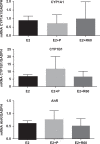Resveratrol and endometrium: a closer look at an active ingredient of red wine using in vivo and in vitro models
- PMID: 24604232
- PMCID: PMC4212329
- DOI: 10.1177/1933719114525271
Resveratrol and endometrium: a closer look at an active ingredient of red wine using in vivo and in vitro models
Abstract
Resveratrol is a natural phytoestrogen with antiproliferative properties present in red wine, grapes, and berries. Published reports on the effects of resveratrol in human endometrial function are limited. The objective of this study was to investigate the expression of estrogen receptor α (ESR1), Ki-67 (a proliferative marker), aryl hydrocarbon receptor (AhR), and members of the cytochrome P450 superfamily of enzymes (CYP1A1 and CYP1B1) in an in vitro and vivo assay. Alkaline phosphatase assay of estrogenicity was used to compare estrogen activity of different concentrations of resveratrol to estradiol (E2) and diethylstilbestrol (DES), using Ishikawa cell culture. Immunohistochemical expression of ESR1 and Ki67, and reverse transcriptase polymerase chain reaction of AhR, CYP1A1, and CYP1B1 were analyzed from xenograft implants of human endometrial tissue in ovariectomized immunodeficient RAG-2-γ(c) mice, after 30 days of treatment with subcutaneous pellets of E2, E2 plus progesterone (P4), or E2 plus resveratrol (6, 30, or 60 mg) for 30 days. Compared to E2, resveratrol acted as an agonist and antagonist of estrogen in low and high concentrations, respectively, when combined with E2. Xenografts of human endometrial tissues in RAG-2 mice exhibited reduced expression of ESR1 and proliferative activity (Ki67) with 60 mg of resveratrol. This study suggests that resveratrol, at high doses, has the potential benefit to reduce proliferation of human endometrium through ESR1.
Keywords: Ishikawa; cell proliferation; endometriosis; estrogen receptor; human endometrium; resveratrol.
© The Author(s) 2014.
Conflict of interest statement
Figures





References
-
- Kinghorn AD, Su BN, Jang DS, et al. Natural inhibitors of carcinogenesis. Planta Med. 2004;70(8):691–705 - PubMed
-
- Sun C, Hu Y, Liu X, et al. Resveratrol downregulates the constitutional activation of nuclear factor-kappaB in multiple myeloma cells, leading to suppression of proliferation and invasion, arrest of cell cycle, and induction of apoptosis. Cancer Genet Cytogenet. 2006;165(1):9–19 - PubMed
-
- Hwang JT, Kwak DW, Lin SK, Kim HM, Kim YM, Park OJ. Resveratrol induces apoptosis in chemoresistant cancer cells via modulation of AMPK signaling pathway. Ann N Y Acad Sci. 2007;1095:441–448 - PubMed
Publication types
MeSH terms
Substances
Grants and funding
LinkOut - more resources
Full Text Sources
Other Literature Sources
Medical
Miscellaneous

